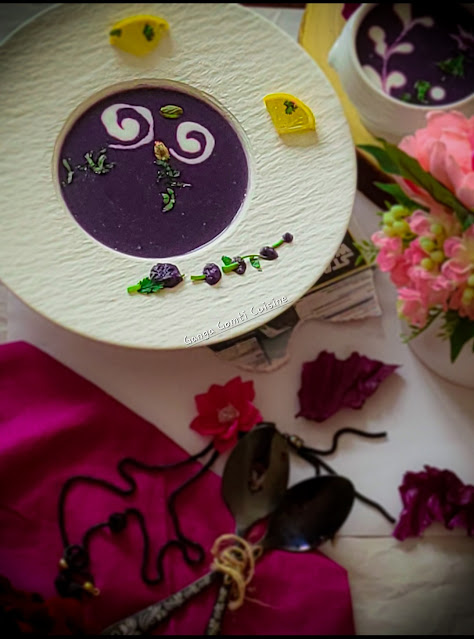Red Cabbage Potato Soup
Red Cabbage Potato Soup
Cooking was the best thing that ever happened to the early man after the discovery of fire. The advancements in pottery allowed man to boil meat, grains, roots, and vegetables, instead of eating them using the roasting method.
Submerging the food in water held more importance. It allowed the food to cook faster and thoroughly. It also provided for better flavors in the soup since the food would release its juices and make the soup tastier. Starches made the soup thicker allowing the meal to be more satiating. Cooking also opened possibilities of including ingredients that would otherwise be inconsumable owing to the bitterness or possibility of poisoning.
In the early middle ages, soup continued to play an integral role in society. When food was scarce, soup was made by dumping all sorts of ingredients in the pot and boiling the contents. The soup was filling and cheap, making it a convenient food item for both the rich and the poor. Since it was made from simple ingredients, it was easy to digest by both the sick and healthy.
After a few decades, soup evolved as the cookery became more diversified and artistic. This is as cooks realized that soup would become more extravagant. It was now prepared artfully and seasoned with a nice touch like we continue to see it today.
The modern restaurant is based on soup. In the 16th century, the French began using the word restaurant to refer to the soup that was sold by vendors in the streets. This soup was advertised as “restoratif” meaning to restore. It was a typical dish sold to help restore energy or heal fatigue.
A Parisian Entrepreneur known as Boulanger invested in a shop that used to serve soup, restoratifs, and eggs. As such, the word restaurant became attached to a place where you could go to buy and eat ready food.
Every culture had its version of soup. From the French Onion to the Russian Borscht, Spanish Gazpacho, New England Chowder, Chinese Won Ton, Campbell’s tomato, Japanese miso, and Italian Minestrone, every soup had its unique flavour regarding its place of origin. Rasam and Sambhar of South India can be identified as India's signature soups.
Red cabbage is distinguished by its coloring, texture and flavor. Like Green cabbage it is rounded and wrapped in tightly wound waxy leaves. The leaves are more violet and burgundian versus true red. Their flavor is far more bold, cruciferous and peppery versus green cabbage, which is also due to the anthocyanin pigments. Red cabbage lacks water weight, which makes its leaves chewier and coarser than Chinese cabbage varieties.
Red cabbage contains a variety of nutrients that are important for bone health. While most people know that vitamin D and calcium are critical to their bone health, other nutrients essential to your bones include vitamin K and magnesium.
Unfortunately, people who eat a typical American diet may not get the amount of these nutrients that they need. Red cabbage is a good source of vitamin K and provides small amounts of calcium, magnesium, and zinc, which can help build and maintain healthy bones. These nutrients in red cabbage help keep the body healthy and may help reduce the risk of health conditions such as cancer, osteoporosis, and heart disease.
Now, let's come to our featured soup. The colorful and vibrant Red Cabbage Potato Soup is a beauty as well as nutritious and delicious!
As it was snowstorm day today, hubby came home early. First, I thought to make Indian fast food but then decided to make soup as it was a perfect day for a bowl of hot soup! Red or purple cabbage was sitting in the fridge and my imagination started working overtime!
Soup was made in a jiffy with intense flavors, served hot and husband said,"It's like a painting!" I was on 9th cloud!
Without further delay, let's move to the recipe...
Ingredients:
- Red cabbage -5-6 leaves (Chopped roughly)
- Potato-1 (Cubed)
- Onion-1 small
- Garlic-3-4 cloves (Sliced)
- Coriander seeds-1 tsp.
- Coriander stems-6-7
- Black peppercorns-5-6
- Green chilli-1
- Salt
- Cream or beaten yogurt -2 tsp.
- Pistachio or any topping of your choice (optional)
- Oil 1 tsp.
- Butter
Procedure:*
* In a pot, add 1 tsp. oil and 1 tsp. butter.
*Now add sliced garlic, saute till light pink.
*Add cubed potatoes, onion, green pepper and coriander stems.
*After stirring for a minute, add cabbage and all the ingredients except cream/yogurt and pistachio.
*Add 1 cup of water and cover and cook till potatoes are well done.
*Cool this and then in a mixer jar, blend it.
*Garnish with thick puree if you want as I have done in wide mouth soup bowl.
*Add required water to the soup and boil.
*Serve hot .
Note: I had these things to make stock and believe me, it was so aromatic, but you can add more veggies as celary and leeks to your stock.
Also I did not use cream in my soup, just made a cream like consistency of yogurt and garnished it.







Comments
Post a Comment